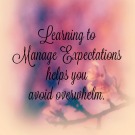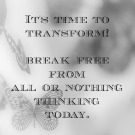Does the thought of change cause your heart to race out of anxiousness or excitement? If you’re in the “heart racing due to anxiousness” camp, rest assured I get you. But I also know from hard-won experience that change does hold hidden opportunities. And by looking at it from a place of curiosity and opportunity, you may be able to give it a try all while managing that beating heart.
Change Gives You a New Perspective
One of the hidden opportunities of change is that it can give you a new perspective, not only on the change itself but often, on yourself. Dealing with the new forces things on you (hence the beating heart) and gives you new opportunities to solve problems. It forces you to be in a new environment, potentially around new people, and it asks you to learn. It gets you in touch with your values (usually very quickly) and sometimes elicits new emotions.
When faced with a voluntary or forced change, take a moment to check in with yourself. You’ll always have your perspective but can it shift? Even if you don’t agree with another person can you at least see their point of view and understand why it is important to them (think values again)? By recognizing that perspective shifts can be beneficial, even if only for the sake of understanding another person, you can respond to change in a more curious and open-minded way.
Change Shows You Your Triggers, Your Strengths, and Opportunities for Growth
Remember when I said that change can sometimes bring up new emotions and will help you learn how to solve problems? These new (and usually strong) emotions are caused by triggers. And when I say triggers, many times people think of negative things like anger and resentment when in fact, you can also be triggered by a joyous surprise that makes you giggle with glee. Make sure when you notice your emotions, you notice all of them and remember; emotions themselves merely are; you give them the value judgment of good or bad.
When you’re involved in something new, you often learn about strengths and skill you never knew you had. If you’ve usually only worked on the details of a project before and were good at it, you may not know if you can link those details to a larger whole and be good at explaining the entire shebang. But what if you’re great at it? What if this is a new skill you never knew you had; linking the details to the bird’s eye view? I’ll harp on this again; stay curious. And more importantly, don’t be afraid to try something different. At the same time, know that change also gives you the opportunity to learn about things that aren’t in your wheelhouse, and when that happens, don’t beat yourself up. Some things just won’t be “your thing,” and as long as those “not your thing” things aren’t being required of you all the time, you can also learn how to manage them and seek help when you need it.
Change Helps You Learn to Get Comfortable with Uncertainty
We live in a world that sometimes seems to move at the speed of light. Things that were here yesterday are gone tomorrow, and it is up to us to learn to adjust and manage the speed and complexity of our ever-evolving environment in ways that keep us grounded in who we are and what cannot be taken away from us. Learning to reach a certain level of comfort (even if it’s a squirmy semi-anxious state of mild discomfort) is required of each of us as we move forward in life and our careers. Being open to change, at least in a sense that we can face it without trepidation, takes practice and a shift in mindset. To do this, it’s helpful to remember:
- You are always in 100% control of how you respond to any situation
- You are always 100% in control of how you view yourself
- You are always 100% in control of how you view your worth
- You are always 100% in control of making choices that are best for you
Knowing all of these things instantly puts you in a place of power; what you ultimately do is up to you in any situation, and this includes how you respond to and learn to manage the change. You may not be in control of the circumstances of your environment, but you are always in control of how you respond and how you feel about yourself. These are things others cannot take away from you unless you allow them to.
Change is ever constant in our fast-paced world. By learning to look at change with a new perspective, you can better understand others, even if you don’t agree with them. Staying open and curious can also help you discover new skills and talents you may not have realized you had. Change opportunities can also clue you into things that are outside of your natural skill set and that you can either develop or choose not to pursue. Lastly, expanding your comfort level with uncertainty can be empowering by remembering that you already have control over so many things.






